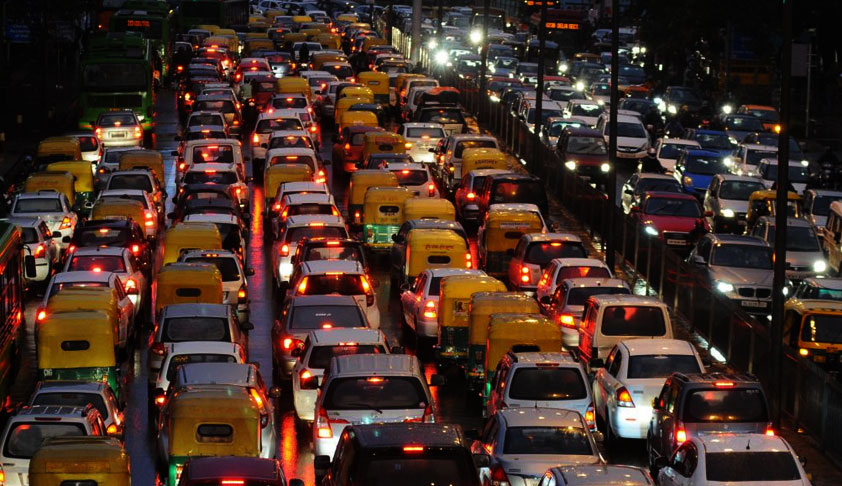Concerns Flagged Over Motor Vehicles Amendment Bill
Manu Sebastian
29 July 2018 12:45 PM IST

The passing of the Motor Vehicles Amendment Bill in the Rajya Sabha has hit a road block after several members from the opposition raised concerns about it. The Bill, which was introduced in Lok Sabha during August 2016, makes several amendments in the Motor Vehicle Act 1988. Though the Bill was passed by Lok Sabha during April 2017, it was sent to a select committee of the Rajya Sabha, when several concerns were raised. The select committee recommended the passing of the Bill without changes. When the Bill was taken for discussion on July 23, it faced tough opposition.
Concerns about erosion of powers of states.
It is the stand of opposition members from Congress, TMC,BJD, CPI(M) etc that the Bill makes encroachment into the powers of state governments in the matter of issuing permits, formulating transport schemes etc. The proposed insertion of Section 88A in the Act is a bone of contention. This new provision empowers the Central Government to make schemes for national, multi-modal and inter-state transportation of goods or passengers. As per the present Act, the power to make scheme for inter-state transportation of goods or passengers is an exclusive domain of the states. Inter-state permits are issued in accordance with reciprocal agreements made by states through such schemes. This is sought to be diluted by the proposed Section 88A. This Section further provides that in the event of any repugnancy between the schemes made by the Central Government and schemes made by two or more States , the schemes made by Central Government will prevail. This proposal has not been received well by the States.
In the matter of issuance of contract carriage permits under Section 74, the amendment provides that the Regional Transport Authority may waive any of the statutory conditions in the interest of last mile connectivity in respect of type of vehicles specified by the Central Government. "Last mile connectivity" being a regional issue, States have wondered as to how Central Government can specify conditions regarding it.
Another bone of contention is the proposed insertion of Section 66A which empowers the Central Government to develop a "National Transportation Policy", for establishing a framework for grant of transport permits. The Section directs the Central Government to consult the State Governments before formulation of policy. However, that has not allayed the apprehensions of States regarding erosion of their power to decide on matters of permit, which is their exclusive domain as per the current Section 66. There is a demand to amend "consultation" as "concurrence" in Section 66A.
The provisions in the Amendment Bill to regulate cab agrregators have also caused dissatisfaction. Recently, the Kartnataka High Court had held that state government has the power to make rules to regulate aggregators under Section 93, although the word "aggregator" is not explicitly stated in the Act. The amendment specifically defines "aggregator" and makes it mandatory for them to obtain license under Section 93. However, the license has to be issued by the State Governments following the guidelines issued by the Central Government.
In this context it is relevant to note that "motor vehicles" is a subject matter in the concurrent list(Entry 35, List III). Hence the Parliament has the power to legislate on matter connected with it, and State Governments can have only such powers as are conferred by the Act. The competency of the Parliament to legislate on such issues is well founded on the Constitutional scheme. Therefore, it is a question of practical feasibility rather than legislative competence, as these issues are to be decided on the basis of regional needs. Therefore, the effectiveness of Central Government intervention in such issues is debatable.
Removal of educational qualifications for transport license.
The amendment has done away with the minimum educational requirement for obtaining transport license. Currently, Class VIII is the minimum educational requirement for transport license. This condition in Section 9(4) is sought to be removed by the amendment. The wisdom behind this move has been questioned, as transport license is used for driving heavy motor vehicles like trucks, buses etc, which have more potential for accidents.
Concerns over Road Safety.
Many civil society members and experts in the field of road safety are unhappy with the Bill, as it does not effectively address concerns over road safety. The "Road Safety Board" proposed by the Bill as per Section 215D has only advisory powers. It is felt that India is in need of a separate "Road Safety Bill" to address concerns relating to road engineering and vehicle designs. Studies in the filed carried out by experts point out that major contributory factors for most accidents are inherent faults in road engineering and vehicle designs, rather than driver negligence. In order to address larger infrastructural issues affecting road safety, a separate legislation, "Road Transport and Safety Bill" was proposed in 2014, which created an autonomous regulatory body "Motor Vehicle Regulation & Road Safety Authority of India", which was accountable to the Parliament.However, that Bill later got shelved, and the Government decided to amend the existing Motor Vehicles Act instead. The Road Safety Board proposed by the Amendment is an authority under the Government, lacking the powers and autonomy of the Authority proposed by the Road Safety Bill.It is also felt that the proposal in the Amendment to enhance the penalties for traffic violations may not lead to desired results, unless root issues are addressed.
Union Minister for Road Transport and Highways, Nitin Gadkari, called for an all-party meeting to discuss concerns over the Bill. The Bill is likely to be taken up for further discussion in Rajya Sabha this week.
(Article discussing certain provisions of the Bill which could work against the interests of claimants seeking compensation for road traffic incidents may be read here)


